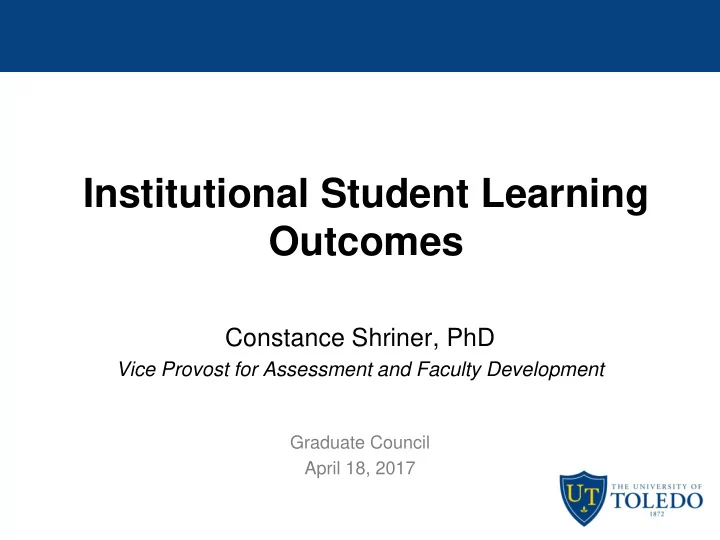

Institutional Student Learning Outcomes Constance Shriner, PhD Vice Provost for Assessment and Faculty Development Graduate Council April 18, 2017
Agenda • Background information and process • Review proposed Institutional Student Learning Outcomes • Identify next steps • FAQs, answer your questions
Background Institutional Student Learning Outcomes (ISLOs): Statements of general knowledge and skills that all graduates should be able to demonstrate at the time of graduation, regardless of academic program of study. Process: • Provost’s Ad hoc committee • Review of other institutions and literature • Degree Qualifications Profile • Draft developed/survey to faculty, staff, students (responses: ~2000) • Draft revised based on input
Five Areas of Learning Applied & Collaborative Learning Graduate/ Professional Bachelors Civic & Global Intellectual Associate s Learning Skills Broad Integrative Specialized Knowledge Knowledge
Five Areas of Learning Flexible based on area of study and level of degree Applied & Collaborative Learning Graduate/ Professional Bachelors Civic & Global Intellectual Associate s Learning Skills Broad Integrative Specialized Knowledge Knowledge
Five Areas of Learning Flexible based on area of study and level of degree Applied & Collaborative Learning Graduate/ Professional Bachelors Civic & Global Intellectual Associate s Learning Skills Broad Integrative Specialized Knowledge Knowledge
Proposed ISLOs Broad and Integrative Knowledge Broad and Integrative Knowledge UT graduates will demonstrate proficiency in using • UT graduates will demonstrate proficiency in using broad, integrative knowledge. broad, integrative knowledge. Specialized Knowledge Specialized Knowledge • UT graduates will demonstrate depth of knowledge in a field and are UT graduates demonstrate depth of knowledge in a field and are able to produce field-appropriate applications, drawing on both their major field of study and other fields. Intellectual Skills able to produce field-appropriate applications, drawing on both Intellectual Skills UT graduates will demonstrate proficiency in using and integrating their major field of study and other fields. • UT graduates will demonstrate proficiency in using and integrating intellectual skills, including communication, across the curriculum. intellectual skills, including communication, across the curriculum. Civic and Global Learning Civic and Global Learning UT graduates will demonstrate the knowledge required for • UT graduates will demonstrate the knowledge required for responsible citizenship, both from their formal studies and from responsible citizenship, both from their formal studies and from community-based learning. community-based learning. Applied and Collaborative Learning Applied and Collaborative Learning UT graduates will demonstrate their ability to integrate and apply • UT graduates will demonstrate their ability to integrate and apply their learning in complex projects and assignments, their learning in complex projects and assignments, including collaborative efforts. including collaborative efforts.
How are students exposed to these areas?
A Common Set of Areas of Learning: Aligned with Current Program SLOs Applied & Collaborative Learning Graduate/ Professional Bachelors Civic & Global Intellectual Associate s Learning Skills Broad Integrative Specialized Knowledge Knowledge
Mapping Program SLOs to ISLOs – Example 2 BS Environmental Sciences 7 SLOs Applied & Collaborative Learning 2 6 Civic & Global Intellectual Learning 2 Skills 3 Broad Integrative Specialized 6 Knowledge Knowledge
Mapping Program SLOs to ISLOs – Example 4 BA Philosophy 6 SLOs Applied & Collaborative Learning 1 5 5 Civic & Global Intellectual Learning Skills 2 Broad 3 Integrative Specialized Knowledge Knowledge
Mapping Program SLOs to ISLOs – Example 5 BS Public Health 24 SLOs Applied & Collaborative Learning 5 19 Civic & Global Intellectual 5 Learning Skills Broad 6 Integrative 15 Specialized Knowledge Knowledge
Mapping Program SLOs to ISLOs – Example 6 MS Biomedical Science – Cancer Biology 22 SLOs Applied & Collaborative Learning 3 Civic & Global Intellectual 6 6 Learning Skills 6 Broad Integrative Specialized Knowledge Knowledge 11
Mapping Program SLOs to ISLOs – Example 7 Doctor of Pharmacy 16 SLOs Applied & 14 Collaborative Learning Civic & Global Intellectual 9 6 Learning Skills 6 Broad Integrative Specialized Knowledge Knowledge 13
Assessing the ISLOs • Anticipate two assessment strategies 1. Assessment of Program Learning Outcomes • Using existing program assessment methods 2. Institutional level assessment • Strategies and instruments will be explored by the University Assessment Committee • Samples of graduating students’ work
Proposed Institutional SLOs 1. BROAD AND INTEGRATIVE KNOWLEDGE: University of Toledo graduates will demonstrate proficiency in using broad, integrative knowledge. 2. SPECIALIZED KNOWLEDGE: Students demonstrate depth of knowledge in a field and are able to produce field-appropriate applications, drawing on both their major field of study and other fields. 3. INTELLECTUAL SKILLS: University of Toledo graduates will demonstrate proficiency in using and integrating intellectual skills, including communication, across the curriculum. 4. CIVIC AND GLOBAL LEARNING: University of Toledo graduates will demonstrate the knowledge required for responsible citizenship, both from their formal studies and from community-based learning. 5. APPLIED AND COLLABORATIVE LEARNING: University of Toledo graduates will demonstrate their ability to integrate and apply their learning in complex projects and assignments, including collaborative efforts.
Next Steps • Request endorsement from Faculty Senate and Graduate Council • Reference to the Institutional Student Learning Outcomes included in the strategic plan • University Assessment Committee – Work with programs to align program learning outcomes with institutional student learning outcomes – Identify institutional level assessment strategies
Anticipated FAQs How are the ISLOs different from our Core Curriculum? Is it going to be expected that programs add new courses to teach the content? Will students need to take more courses to graduate? If UT adopts a new set of learning outcomes that apply to all programs, will my program have to assess them? Is this going to mean more work for faculty? How will these new outcomes be assessed?
Additional Questions Constance Shriner Constance.Shriner@utoledo.edu 530-4509
Mapping Program SLOs to ISLOs – Example 1 General Education 5 SLOs Applied & Collaborative Learning 1 5 Civic & Global Intellectual 2 Learning Skills Broad Integrative 5 Specialized Knowledge Knowledge
Mapping Program SLOs to ISLOs – Example 3 BA Art History 5 SLOs Applied & Collaborative Learning 3 Civic & Global Intellectual Learning 1 Skills 1 Broad Integrative Specialized Knowledge Knowledge
Recommend
More recommend